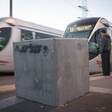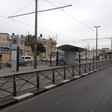The Electronic Intifada 4 February 2010
French transport giants Veolia and Alstom are involved in the construction and running of a light rail line which connects West Jerusalem to several illegal settlements in or surrounding occupied Palestinian East Jerusalem. The light rail project is part of the “Jerusalem Transportation Master Plan” sponsored by the Israeli government and the Jerusalem municipality. In reality, the project is intended to strengthen Israel’s grip on occupied East Jerusalem. Palestinian officials recently announced that they will call on Arab countries to end business ties with Veolia and Alstom at the planned Arab League summit in March.
Israeli settlements in the Occupied Palestinian Territories (OPT) and the annexation of East Jerusalem are illegal under international law. Numerous UN resolutions and the 2004 advisory opinion of the International Court of Justice on Israel’s wall in the occupied West Bank have confirmed this. With their involvement in the Jerusalem light rail project, Veolia and Alstom are directly implicated in maintaining illegal settlements in the OPT. Moreover, the companies are playing a key role in Israel’s attempt to make its illegal annexation of Palestinian East Jerusalem irreversible.
Since Israel occupied East Jerusalem after the June 1967 Arab-Israeli war, successive Israeli governments have tried to expand its claims on the city as the capital of Israel. East Jerusalem, which contains the historic Old City, was annexed by Israel after the war, a move that was not recognized by the international community. The Jerusalem Development Authority (JDA), which operates under the 1988 Jerusalem Development Authority Law, was established to further entrench Israeli control over the city. Indeed, the Prime Minister’s Office and the mayor of Jerusalem sponsored a JDA program to work toward this goal. On its website the JDA is very clear about the role of the Jerusalem light rail project, stating that “The investment in the light railway project was one of the government’s key strategies to empower Jerusalem as a capital.”
Meanwhile, Israeli Prime Minister Benjamin Netanyahu continues to openly claim all of Jerusalem — including occupied Palestinian East Jerusalem — as the capital of Israel. According to the Jerusalem Post, Netanyahu told reporters at a press conference during the elections early February 2009, “We did not return to Jerusalem after praying for it to be rebuilt for 2000 years in order to give it up. We did not unite the city in order to divide it, and my government will maintain a united Jerusalem. A sane country does not give its capital to its enemies.” A few months later, Netanyahu addressed an official ceremony on 21 May, stating that “United Jerusalem is the capital of Israel. It will never again be divided or cut in half. Jerusalem will remain only under Israel’s sovereignty. Government spokesman, Mark Regev, expressed the same view telling the BBC on 25 November 2009, “We make a distinction between the West Bank and Jerusalem. Jerusalem is our capital and remains such.”
The Israeli claim on Jerusalem inspired Israeli linguist Avshalom Kor to propose Hebraizing the names of all stations in Jerusalem’s light rail, reported the Israeli daily Haaretz on 28 December. He made his proposal to the joint governmental-municipal task force overseeing the light rail project. Kor said that giving an Arab name to a station would encourage illegal construction by Palestinians.
However, Israel’s repeated claims to Palestinian East Jerusalem are not acceptable to the European Foreign Affairs Council (EFAC). In a press release discussing the EFAC’s 8 December 2009 meeting, the Council expressed its deep concern about the situation in East Jerusalem. The EFAC reiterated that it has never recognized Israel’s annexation of East Jerusalem and added that negotiations must resolve the status of Jerusalem as the future of two states if there is to be a genuine peace.
Although these statements are welcome, words are insufficient. Europe has the capacity to do more than issuing press releases. Two French companies are involved in a light rail project that strengthens Israel’s grip on East Jerusalem. Under European law, European governments have the power to exclude Veolia and Alstom from bidding for a public contract or to reject any such bid where it is found that the individual or organization has committed an act of “grave misconduct” in the course of its business of profession. This clause is explicit in Directive 2004/18/EC of the European Parliament and of the Council of 31 March 2004 on the coordination of procedures for the awarding of public works contracts, public supply contracts and public service contracts. Veolia and Alstom’s partnership in the Jerusalem light rail project can be characterized as grave misconduct, because it involves assisting Israel in its violations of international law.
Last month, Ahmed Rweidi, an advisor to Mahmoud Abbas, President of the Ramallah-based Palestinian Authority, announced that Palestinian officials will once again call on Arab countries to cut business ties with Veolia and Alstom. Abbas, whose term as President expired in January 2009 and is currently in power under controversial emergency laws, plans to attend the Arab League summit in March, where according to Rweidi the issue will be raised. Rweidi told the Associated Press on 29 January that “This is the least Arabs can do to support our rights in Jerusalem.”
In response, David Hadari, one of Jerusalem’s deputy mayors, told the Jerusalem Post that he was disturbed by the interference of the Palestinian Authority. Hadari stated that “They’re simply interfering with the planning policy of the State of Israel. It’s unacceptable, and at the end of the day the Jerusalem Municipality will do all that is needed to strengthen ties with these companies.”
Meanwhile concerned citizens continue their efforts to hold Veolia and Alstom to account. In Europe, nongovernmental organizations, trade union activists, lawyers and citizens continue to pressure pension funds and banks to divest, and call on authorities to exclude Veolia and Alstom from public bidding.
Adri Nieuwhof is a consultant and human rights advocate based in Switzerland.





